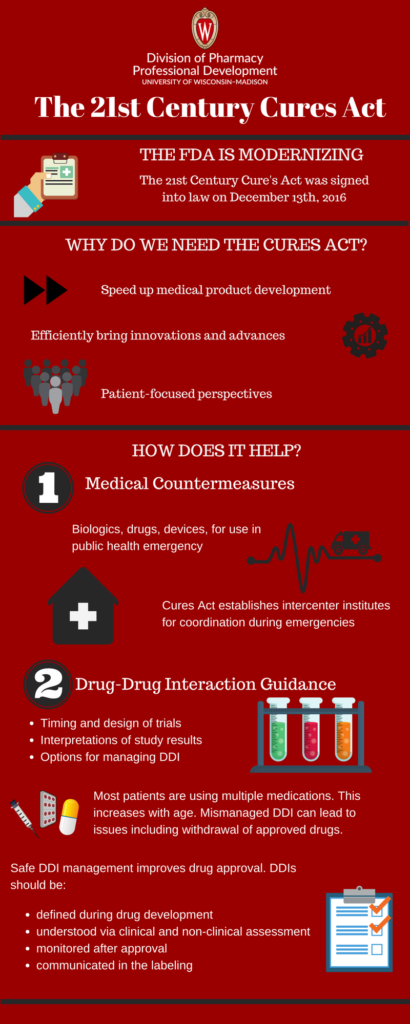21st Century Cures Act in a 20th Century System?
Despite being the organization all US pharmaceutical companies must obey, the Food and Drug Administration (FDA) isn’t always regarded as “modern” or “innovative.”
What is the Cures Act?
However, the FDA is attempting to change its image. It is trying to modernize and streamline its processes. The 21st Century Cures Act (Cures Act) was signed into law on December 13th 2016. This law is designed to help accelerate medical product development and more efficiently bring innovations and advances to the patients who need them.
The FDA has been working hard to incorporate patient perspectives in its decisions. The Cures Act is a result of this commitment. It enhances the FDA’s ability to modernize clinical trial designs and outcome assessments. This will speed the development and review of novel medical products.
Impact on Medical Countermeasures 
One novel product that benefits from this is Medical Countermeasures (MCM). MCMs are biologics, drugs, or devices that can be used during a public health emergency. MCMs can prevent, protect or treat from a wide variety of threats including outbreaks and radiation.
The Cures Act directs the FDA to create one or more intercenter institutes. These institutes will to help coordinate activities in major disease areas between drug, biologics and device centers. The anticipated implementation timeline is over 9 years. The FDA has budgeted $500 million to cover the cost of implementation.
Addressing Drug-Drug Interactions
In October of 2017, the FDA released their much anticipated draft guidance for clinical drug interaction studies. It focuses on the conduct of clinical studies to evaluate drug-drug interactions (DDIs) during drug development including:
- The timing and design of the clinical studies
- The interpretation of study results
- The options for managing DDIs in patients.
A companion guidance titled “In Vitro Drug Metabolism-and Transporter-Mediated Drug-Drug Interaction Studies” was also released. The companion guide focuses on in vitro DDI potential assessment and how to use results from DDI assessments to inform clinical studies. DDIs are important because patients often use more than one medication at a time. As patients age their potential for multiple medication use increases.
Unanticipated, unrecognized, or mismanaged DDIs can lead to several issues. They are an important cause of morbidity and mortality associated with prescription drug use. In some cases, they have caused the withdrawal of approved drugs from the market.
Understanding how to safely manage a DDI may allow the FDA to approve drugs it may have deemed too risky. This is why, clinically relevant DDIs between the investigational drug and other drugs should be:
- defined during drug development
- understood via nonclinical and clinical assessment at approval
- monitored after approval
- communicated in the labeling
Currently these documents do not establish and legally enforceable responsibilities. However, they do reflect the FDA’s thought process and provide valuable recommendations.
New Opportunities for DMPK: The 21st Century Cures Act
The FDA is innovating to serve patient perspectives. These innovations will shape the future of the pharmaceutical industry.
Make sure to attend the 21st Annual DMPK Conference this September. This year’s conference focuses on the Cures Act and the new DDI guidances. If you are curious about these new guidances, you will hear both the industry response as well as FDA commentary. Some of the featured presentations this year are:
- Mike Sinz from BMS will be discussing the in vitro DDI guidance
- Elimika Pfuma Fletcher from the FDA will discuss the clinical guidance
- John Lambert from PARAXEL will discuss the EMA guideline on first in human clinical trials
The talks will be followed by a panel discussion with the speakers. Attendees will be able to ask questions and engage in discussions.
The September Land O’ Lakes Conference on Applied Drug Metabolism and Applied Pharmacokinetics should be your first choice for industry updates. Get regulatory guidance updates as well as other advances and innovations in the DMPK field. Connect with experts from around the world.
Learn more and register for the September Land O’ Lakes.
Mark your calendar for September 17-20. 2018
